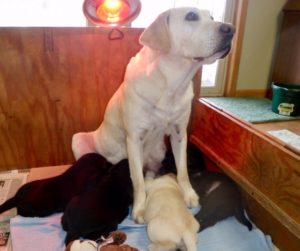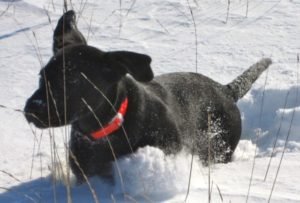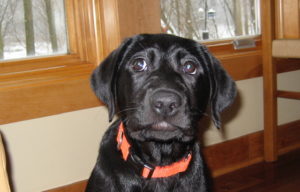An article from WWA’s Doctor’s Orders
This article originally appeared in Wisconsin Waterfowl Association’s May 1, 2019 eNewsletter. All images are courtesy of WWA Executive Director Bruce Ross and his WWA Canine Life Member dogs Calypso and Tar “the wonder dog” Ross.
 By K.C. Brooks, an avid waterfowler, dog lover and practicing veterinarian at Lodi Veterinary Care.
By K.C. Brooks, an avid waterfowler, dog lover and practicing veterinarian at Lodi Veterinary Care.
One of the most difficult tasks we face as gun dog owners is selecting a puppy. Hundreds of articles and even books have been written on the subject. I would like to submit my expertise on the subject in hopes of making your search more successful. Much of what I have to offer is written from a veterinarian’s perspective. Hopefully it will increase your odds of obtaining a healthy puppy that grows to adulthood free of common genetic diseases. Many of these diseases can hamper a dog’s hunting career or even put their life as a pet at risk. Some of what I have to offer is just a review of important things that are critical to getting a good fit for both owner and puppy. I have divided my advice into five homework assignments.
Assignment #1: Do your homework prior to looking at a puppy. Ask yourself important questions. What is the primary purpose of my new puppy? Which breeds are best suited for the type of hunting I do? What size of dog is most compatible with my home and hunting style? Is my budget prepared for purchasing, training and caring for a hunting dog?
Assignment #2: Research the common medical concerns for the breed you have chosen. Many breeds have unique problems that can severely limit their hunting career or lifespan. Exercise Induced Collapse (EIC), Hip Dysplasia, Elbow Dysplasia, Hypothyroidism, Retinal disease and some forms of cancer tend to be found in lines of certain breeds. Knowing what the breed is most at risk for allows you to ask the right questions about what has been done to minimize the chance of those diseases impacting your puppy. Your veterinarian should be a good source for information on what commonly causes problems in certain breeds.
Assignment #3: Seek information on reputable breeders of the breed you are interested in. Nothing increases your odds of getting a sound puppy more than a breeder with a long history of producing sound puppies. This is almost always done by taking the necessary steps to screen their breeding stock for potential genetic diseases before mating. Ask specifically about the screening procedures they perform on their breeding stock. Walk away from the ones who haven’t bothered to do the proper screening. Ask for a list of people who have purchased puppies from the breeder. If the stud or dam has been bred before, references from those who own their offspring are especially important. Once again, the breeder’s veterinarian can be a good source of information – if the breeder is willing to release records to you.
 Assignment #4: Do a home/kennel visit if at all possible. The best indication of what your new puppy is likely to look, act and hunt like is its parents. Being able to see both parents personally is ideal. Being able to see the parents work is even better. Pay close attention to size, conformation, temperament, hunting drive and the parents’ interactions with all humans. While a pedigree lined with champions three and four generations back is impressive, pay most attention to mother, father and grandparents. They are likely to make or break the puppy’s genetic makeup. While it is not always possible to see both parents, avoid breeders who actively discourage you from home visits. The breeder should be proud of their breeding stock and their facilities.
Assignment #4: Do a home/kennel visit if at all possible. The best indication of what your new puppy is likely to look, act and hunt like is its parents. Being able to see both parents personally is ideal. Being able to see the parents work is even better. Pay close attention to size, conformation, temperament, hunting drive and the parents’ interactions with all humans. While a pedigree lined with champions three and four generations back is impressive, pay most attention to mother, father and grandparents. They are likely to make or break the puppy’s genetic makeup. While it is not always possible to see both parents, avoid breeders who actively discourage you from home visits. The breeder should be proud of their breeding stock and their facilities.
Assignment #5: Pick the right puppy! I say this a bit in jest. Picking puppies is not an exact science. In general I would suggest that you avoid excessively large or small puppies. I would suggest not picking the most out-going puppy, nor would I advise picking the shyest puppy. If distance does not make it impractical, making more than one visit to observe the puppies is advised. With that said, I have heard of many exceptions to the above guidelines for picking a puppy out of a litter. For the most part, steps 1-4 above are far more important than trying to guess which individual puppy is likely to be best.
Adding a puppy to your house is a big step. Start early and do your homework well to increase the odds that your puppy will turn out to be the ideal hunting companion and family dog that you so desire. Enjoy your puppy!



